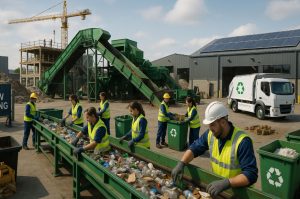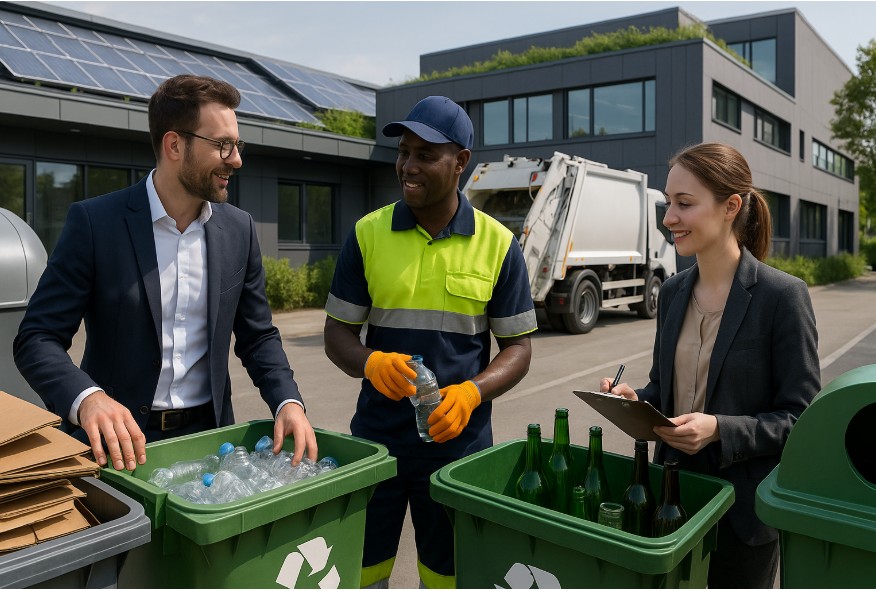The UK Government has announced a transformative £1.1 billion investment into England’s recycling services but how will this shift reshape packaging regulations, business responsibilities, and startup opportunities? Here’s what founders, councils, and innovators need to know.
Why Is the Government Changing Who Pays for Recycling?

Traditionally, local councils and taxpayers have covered the cost of collecting and recycling household packaging waste. That’s now being reversed.
Under the new Extended Producer Responsibility (EPR) for Packaging scheme, businesses that produce packaging will be required to cover the cost of its disposal. From milk bottles to e-commerce delivery boxes, if your business puts packaging on the market, you’ll be expected to pay for its end-of-life management.
This change aims to:
- Relieve pressure on local councils
- Encourage producers to reduce packaging use
- Incentivise recyclable and reusable material choices
| Packaging Type | Cost to Producer |
| Easily recyclable | Lower |
| Hard-to-recycle | Higher |
| Refillable or reusable | Encouraged with minimal fees |
The message is clear: waste less, recycle more, and take full responsibility for your packaging.
How Will the £1.1 Billion Be Used by Councils?
The funding is being directed to every local authority in England to improve household recycling services. Councils will be expected to use the money for:
- Streamlining and expanding recycling collections
- Building or upgrading waste processing infrastructure
- Supporting technology and logistics improvements
An example is Veolia’s Southwark facility, which collects waste from homes and processes it into new materials. With this boost, more facilities like this can be developed or modernised across the country.
Importantly, the government has made clear that councils must use the funding exclusively for improving packaging waste services. The oversight body, PackUK, has the authority to reduce future allocations if the funds are misused.
What Are the Broader Economic Impacts of This Reform?

This is not just an environmental policy it’s an economic engine.
Estimates suggest the EPR system will:
- Support up to 25,000 new green jobs
- Unlock £10 billion in recycling infrastructure investment
- Drive innovation in packaging design, recycling tech, and logistics
It’s a long-term growth plan, backed by policy, regulation, and funding. Key stakeholders from local government, environmental groups, and major waste companies like Veolia have welcomed the reform.
How Will These Changes Affect UK Startups?
For startups, particularly in sustainability, packaging, or digital solutions, this reform opens up major growth opportunities.
Startups can step in with solutions to help producers and councils meet new requirements, including:
- Eco-friendly packaging alternatives
- Waste tracking and reporting tools
- Smart logistics and material recovery technologies
- Compliance consulting and packaging design services
As more businesses look to avoid higher EPR fees and enhance their environmental credentials, startups with scalable, innovative offerings are in a strong position to partner, supply, or consult.
What Other Recycling Reforms Are on the Horizon?
The £1.1 billion investment is part of a broader shift in UK waste and recycling policy. Several more initiatives are coming soon:
| Reform | Timeline | Purpose |
| Simpler Recycling for Workplaces | March 2025 | Consistent rules for commercial waste collection |
| Simpler Recycling for Households | March 2026 | Unified recycling systems across England |
| Deposit Return Scheme | Launching in 2027 | Cash incentive for returning drink containers |
| Circular Economy Strategy | Autumn 2025 | Industry roadmaps for reducing material waste |
Each of these policies adds further opportunities for startups to create tech, tools, and services that help industries adapt to this evolving landscape.
Why Should Startup Founders Act Now?
This reform marks a turning point where environmental policy and entrepreneurial opportunity intersect. With funding now in place, and business responsibilities clearly outlined, the recycling and waste ecosystem is being reshaped and startups that move early stand to benefit most.
Whether you’re building sustainable packaging, developing smart waste solutions, or offering digital compliance platforms, your market is expanding rapidly. Backed by national funding and strong regulatory momentum, now is the time to position your startup as a critical part of the UK’s circular economy.
FAQ
What is the Extended Producer Responsibility (EPR) scheme?
It’s a new policy that makes packaging producers responsible for the full cost of recycling their products.
How much funding will councils receive under this reform?
Councils across England will receive £1.1 billion in 2025 to improve recycling services.
Who pays for recycling now under the new rules?
The cost shifts from taxpayers to the businesses that create packaging waste.
How does this impact UK startups?
It creates new opportunities for startups in eco-packaging, recycling tech, compliance tools, and green logistics.
What other recycling policies are being introduced?
Upcoming reforms include a Deposit Return Scheme in 2027 and simpler recycling systems for households and workplaces.




